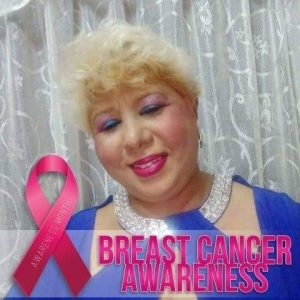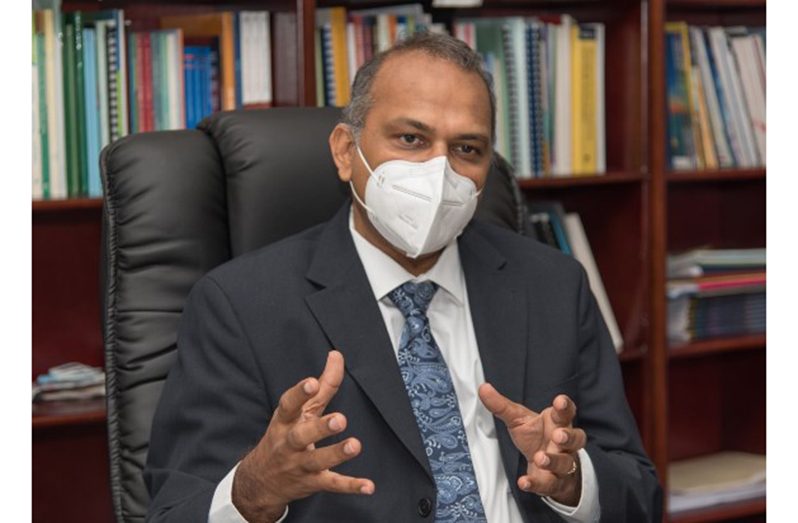OVER the next few years, developing a comprehensive cancer-care programme, geared at improving cancer and chronic disease control, will be a priority for the Ministry of Health, according to Minister of Health, Dr. Frank Anthony.
Based on data from the Ministry in 2017, cancer is the third leading cause of death in Guyana. It was reported that there is a mortality rate of 21.0 per 100,000 persons.
“A lot of the cancers that we have in Guyana, we have been making attempts over the years to get a better understanding of them, getting better information on prevalence and so forth but I don’t think we’re there yet because we really don’t have a good picture of the various cancers that we have and the true prevalence of these diseases,” Minister Anthony told the Guyana Chronicle in a recent interview.
Key areas in need of improvement include screening capabilities with a focus on pathology in order to classify the cancers and stage them; laboratory capabilities and the type and quality of treatment offered (such as radiotherapy and chemotherapy). Of course, greater focus has to be placed on preventive measures.
But while these measures can be introduced and programmes developed, human resource capacity remains imperative. Dr. Anthony related that there are not many persons trained in the field of oncology (the study of cancer).
“That’s an area we have to look at, because if we are going to improve clinical care for cancer patients, then definitely [human capacity] is an area we have to look at,” he said, adding, “It’s not just in adult oncology, but we also have to look at paediatrics oncology.”

There is also a need for an improved cancer registry, the Minister said; data collection and analysis and then making this data publicly available have been an enduring bugbear for Guyana. Data is not only used for public information and record-keeping but it allows for trends to be studied among other things, thereby allowing for evidence-based medical interventions.
Cognisant of all of these areas where improvements can be made, Dr. Anthony said, “This is definitely one of the priority areas for the Ministry, and, over the next couple of years, we will have to build out a more comprehensive cancer care programme.”
The task ahead is extensive; to better understand the need for improved cancer care in Guyana, let’s examine just one type of cancer – breast cancer. As per the 10-year Cancer Profile 2003-2012 of Guyana, breast cancer was one of the leading causes of death in Guyanese women and although awareness activities on this specific cancer have increased significantly, the debilitating effects continue to plague many women and few men.
Annually, Guyana observes Breast Cancer Awareness month in October; it is not uncommon to see pink ribbons adorn workplaces, public spaces and even people’s attire. There are numerous commercial activities underpinning breast cancer awareness too.
Despite this, Founder and President of the Guyana Cancer Foundation, Bibi Hassan, lamented that many persons, women especially, are not aware of the signs and symptoms of this cancer.
According to the World Health Organisation (WHO), breast cancer develops from breast tissue; symptoms of this cancer include a lump in the breast, dimpling of the skin, or other changes in the appearance of the breast area. If left untreated, cancer may metastasise (spread to other areas of the body) and this is typically fatal. But, if detected early enough, it can be treated successfully.
“A lot of cancer patients come when they’ve gone too far – at Stage Three and Four – where I can’t really do anything,” Hassan told the Guyana Chronicle in a recent interview.
She emphasised that once any bodily changes are observed, you should contact your healthcare provider immediately. Her mantra is: “Early detection helps save lives.”
Rosaline Clarke, a 62-year-old woman, and breast cancer survivor was one woman who was able to detect her cancer early enough. She told the Guyana Chronicle that soon after feeling a lump in her left breast, she sought medical attention. While she was diagnosed with breast cancer and subsequently surgically removed her left breast, she has been able to avoid cancer’s fatality.
Clarke’s case, however, is not common with many other women, particularly in the hinterland regions, Hassan related. Many of those women discover their condition too late and would not benefit from sufficient cancer care.
“Our systems in the regions, especially cancer care, are very rudimentary,” the Health Minister acknowledged.
He, however, posited: “We will have to spend some time in developing a programme, not just one fragment here and another fragment there, but to look at the thing in a more holistic way; again it comes back to prevention treatment and care.”
Even if all of the necessary improvements cannot be made sooner rather than later, it is important that capacity is built out at various levels.
The Health Minister reasoned that if there is not an oncology programme in every regional hospital in another two years, then there must be doctors who are trained to at least do the preliminaries and then refer the patients into a more specialised programme.





.jpg)








